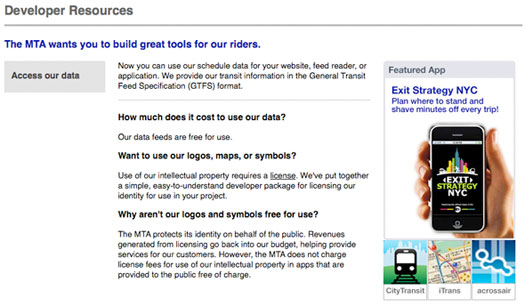MTA Unveils Open Data Policy, Clearing a Path for NYC Transit Apps
 In a big turnaround, the MTA now touts third-party transit applications on its website.
In a big turnaround, the MTA now touts third-party transit applications on its website.The MTA took an important step toward improving the rider experience today, announcing that the agency will open its route and schedule data to third party software developers. The policy change — a major turnaround — promises to take some of the guesswork out of riding MTA buses, subways, and commuter trains.
The agency’s new policy does away with time-consuming data-sharing
procedures and burdensome licensing requirements. As of today,
schedule, route and fare information are available directly from the
MTA website in a standard format, and the data will be updated whenever service changes. Similar set-ups have allowed developers to create scores of transit applications for cell phones and web browsers in other cities, giving riders convenient access to up-to-date information.
"We need to get out of our own way and instead get out in front of the data sharing revolution," MTA Chair Jay Walder said in a statement (the agency also unveiled a revamped website this afternoon). "By making access to our data directly from our website, we are encouraging the developer community to do the work we can’t to create apps that benefit our customers at no cost to the MTA."
Advocates for open data are optimistic that the changes
will create an environment where the development of transit applications can flourish, and transit riders will reap the benefits.
"I’m heartened to see the MTA acknowledge the value of the developer community to the agency and transit riders, and can’t wait to see the innovative apps that will surely result from the release of this data," said Nicholas Bergson-Shilcock, a project manager at The Open Planning Project who has urged the MTA to open its data (TOPP is Streetsblog’s parent organization). As the nation’s largest transit agency, the MTA sets a highly visible
example, Bergson-Shilcock noted: "The MTA’s release of open data sends a clear message to
agencies throughout the country: It’s time to open up."
Today’s announcement signals a dramatic turnaround from the days when developers had to submit freedom of information requests to get data out of the MTA, and the agency’s intellectual property lawyers threatened to sue developers. "It’s a great start and I am stunned at how Jay Walder has been able to
make this happen in the timeframe, given my past experiences working
with MTA on similar issues," said Chris Schoenfeld, the developer
behind the Metro-North-focused application StationStops, who faced off
with the MTA over data access as recently as last summer. "Today’s announcement reverses this atmosphere 180 degrees."
The sheer size of the MTA’s customer base — 11 million riders on a typical weekday — means developers will have big incentives to create new applications. "I would imagine that New York will pull ahead of every other city in terms of transit apps and innovation," said Matt Lerner, Chief Technology Officer with City-Go-Round, a website that advocates for open transit data.
The City-Go-Round homepage prominently features a list of the ten largest transit agencies without open data policies. Up until a few minutes ago, the MTA was the top target on the list. That distinction now belongs to NJ Transit.


